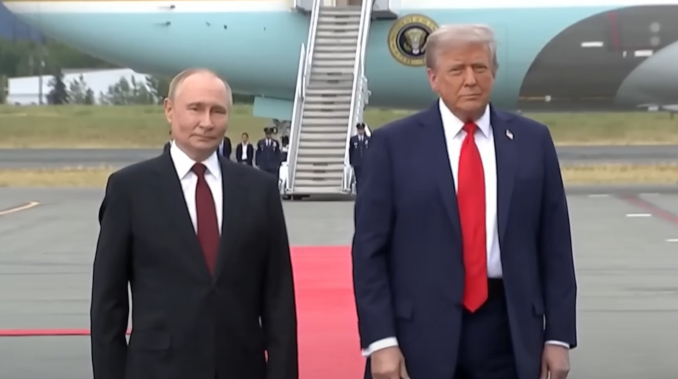
By Phil Giraldi
Why is it that President Donald Trump is actively seeking to obtain the Nobel Peace Prize, even going so far as to boast falsely that he has already earned it “four or five times,” while the United States is simultaneously actively supporting two major avoidable armed conflicts in Gaza and Ukraine while also removing existing restraints on development and deployment of certain weapons that are designed for nuclear war?
Click the Link Below to Listen to the Audio of this Article
Those who are inclined to look to make excuses for government behavior might argue that Trump doesn’t know any better and is therefore always inclined to act aggressively when in doubt, but the systematic withdrawal from Cold War agreements designed to make nuclear war avoidable rather suggests that it is now policy to make a catastrophic war easier to engage in to establish and maintain American global military dominance over adversaries like China and Russia.
The dismantling of post-World War II agreements unfortunately has dramatically increased the possibility of a devastating nuclear war taking place. The number of nuclear armed countries has grown in spite of nuclear non-proliferation policies, with North Korea, China, Pakistan, India and Israel all now having nuclear arsenals. Israel even has a plan to use the nukes if it is seriously threatened called the “Samson Option.”
The Bulletin of the Atomic Scientists, located at the Keller Centre of the University of Chicago, monitors the movement of the minute and second hands on the so-called Doomsday Clock.
It is now reporting that the second hand is closer to midnight than it has ever been, 89 seconds away, and moving in the “wrong” direction, toward inevitable armed conflict or even natural catastrophe. Reaching midnight in this context could mean nuclear war, which could plausibly extinguish life on Earth.
The United States is the only country that has ever used nuclear weapons against an enemy, which took place against Japan in early August 1945, destroying the cities of Hiroshima and Nagasaki and killing at least 170,000, mostly civilians.
My father was at that time an infantry sergeant on a troop ship located offshore of the Japanese mainland, part of a new Army corps, the Eighth Army, which was about to undertake an invasion of Japan’s main island. It promised to be bloody, and the word among the troops was that Japan would put up a fierce last-stand resistance.
The American soldiers were consequently happy to hear that the bombs were used and the war had ended with an immediate Japanese surrender.
More recently, however, historians have come around to the view that Japan was about to surrender anyway, which it did six days after the bombings, and it was a bad decision by President Harry Truman to authorize the use of the new and devastating weapon.
After World War II, the Soviet Union, benefiting from the secrets stolen by spies Julius and Ethel Rosenberg in the United States, also acquired nuclear weapons and became a nuclear power, joining the United States and Britain. The deployment of nukes subsequently became part of the tit-for-tat maneuvering that characterized the Cold War.
The crisis came when Russia declared its intention to base nuclear-capable missiles in Cuba, 90 miles from the United States and therefore capable of hitting targets anywhere in America, as a deterrent of any possible moves by Washington to again invade Cuba.
The move was also in response to U.S. basing nuclear missiles in NATO countries Italy and Turkey. It seemed some kind of nuclear exchange was imminent when the leadership of the United States and the Soviet Union came to their senses.
In 1962 President John F. Kennedy and Chairman Nikita Khruschev agreed that playing nuclear risk was just not worth it, and the Russians declared that their missiles would not be going to Havana and the United States agreed that its Jupiter missiles would also be withdrawn from Turkey.
This led to other agreements to limit the likelihood that nuclear weapons might actually be used in a war. The most important agreement was the Intermediate Range Nuclear Forces (INF) Treaty, which was signed by President Ronald Reagan and Secretary General Mikhail Gorbachev in 1987 but which the United States withdrew from in October 2018 during the first Trump administration.
The INF banned both nuclear and conventional land-based missile systems and missile launchers with ranges of 620–3,420 miles) (“intermediate-range”) and 310–620 miles (“shorter-range”), meaning that the mobile missile systems could not be developed for deployment and possible use close to a country’s border where they might be capable of a devastating surprise first strike against the “enemy.”
Prior to the U.S. withdrawal, there were claims from both sides that there had been violations by the other nation in terms of what the treaty allowed. When Trump ordered the government to withdraw from the INF treaty, it claimed Russia was in violation through its development of a new highly sophisticated ground-launched cruise missile. Russian officials responded that the missile had a maximum range of only 298 miles, making it legal.
Russia replied that there was a possible U.S. violation of the INF treaty through its establishing its own Aegis Ashore missile defense systems that were based in NATO members Romania and Poland, close to the Russian border. The U.S. systems use highly mobile Mk-41 vertical launchers, which can accommodate Tomahawk missiles.
The United States under Trump would not negotiate with Russia and there was some speculation that the reason Washington had withdrawn from the INF treaty was so it would have a free hand to deploy its intermediate-range missiles near China.
Russia responded by proposing that the over-the-limits INF missiles be banned in Europe only, but Washington never discussed and never accepted the compromise offer.
Since withdrawing from the treaty, the Pentagon has developed a mobile missile launcher called the “Typhon,” which can launch nuclear-capable Tomahawk missiles having a range of over 1,000 miles. The United States has deployed the Typhon to the Philippines and there are reported to be plans to deploy Typhon to Germany next year.
Russia has responded to what it sees as the U.S. provocations, like Typhon. The Russian Foreign Ministry issued a statement on Aug. 4 which declared that:
With our repeated warnings on that matter having gone ignored and the situation developing toward the de facto deployment of U.S.-made intermediate-and shorter-range ground-based missiles in Europe and the Asia-Pacific region, the Russian Foreign Ministry has to declare that any conditions for the preservation of a unilateral moratorium on the deployment of similar arms no longer exist, and it is further authorized to state that the Russian Federation does not consider itself bound by relevant self-restrictions approved earlier.
The ministry decried how the:
“formation and buildup of destabilizing missile potentials in regions adjacent to Russia, [is] creating a direct, strategic threat to the security of our country. … Russia’s leadership [will respond] based on an interdepartmental analysis of the scale of deployment of U.S. and other Western ground-based INF missiles.
The Trump administration’s inept moves to increasing U.S. national security by discarding agreements intended to remove or at least mitigate the threat of nuclear war should be considered in context.
The INF Treaty could be viewed in the same fashion as the Joint Comprehensive Plan of Action (JCPOA) agreement to monitor Iran’s nuclear program to keep it from becoming a path to the acquisition of a nuclear weapon.
Developments since the United States withdrew from the program in 2019 suggest strongly that the subsequent attacks on Iran by both Israel and the United States have, if anything, increased the likelihood that the next Iranian government will seek to weaponize nuclear power through a secret program.
Hardly a good outcome but, when one is considering developments with both Russia and Iran, it is unfortunately true that what has been broken without regard for the consequences can no longer be mended.




















